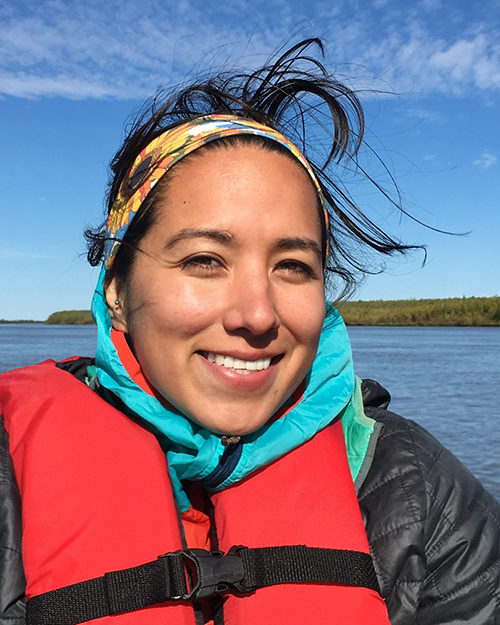
Janessa Esquible
Ph.D. Student
Fisheries
PO Box 188
Glennallen, Alaska 99588
907-406-0040
jaesquible@alaska.edu
- Courtney Carothers
- Jessica Black
- Theresa John
- Curry Cunningham
I'm Janessa Esquible and from Detroit, Michigan. I am Mexican-American and Ojibwe and a member of the Walpole Island Band in Bkejwanong territory. My first move to Alaska was in 2014 after completing my Zoology degree at Michigan State University with a specialization in American Indian Studies. From 2016-2021, I was employed by Orutsararmiut Native Council, the Tribe of Mamterilleq/Bethel, Alaska, in their Natural Resource Department. I moved to Glennallen with my family in 2022 and currently live and work on the ancestral & unceded territories of the ’Atnahwt’aene people.
Esquible, J.A., and S. Atkinson. 2019. Stranding trends of Steller sea lions Eumetopias jubatus 1990–2015. Endangered Species Research 38:177–188. https://doi.org/10.3354/esr00945
Esquible, J.A., K. Burek-Huntington, S. Atkinson, A.C. Klink, E. Bortz, T.A. Goldstein,
K. Beckmen, K. Pabilonia, and R. Tiller. 2019. Pathological findings and survey for
pathogens associated with reproductive failure in perinatal Steller sea lions Eumetopias jubatus. Diseases of Aquatic Organisms 137(2): 131–144. https://doi.org/10.3354/dao03421
Inman, S. C., J. Esquible, M. L. Jones, W. R. Bechtol, and B. Connors. 2021. Opportunities
and impediments for use of local data in the management of salmon fisheries. Ecology
and Society 26(2):26. https://doi.org/10.5751/ES-
Lipka, C.G., T. Hamazaki, M. Horne-Brine, and J. Esquible. 2019. Subsistence salmon
harvests in the Kuskokwim area, 2016. Alaska Department of Fish and Game Fishery Data
Series No. 19-09, Anchorage.
I am interested in how Indigenous ways of knowing and understanding are used to guide fisheries management decisions along the Kuskokwim River. I am also interested in how Yup'ik and Athabascan values are reflected in fisheries management and bridging knowledge systems. I feel it is so important for scientists, managers and biologists to reconsider what constitutes "knowledge" and to promote Indigenous land-based knowledge systems as co-equal to western science. I am hoping to document and better understand the inequities inherent in fisheries management and natural resource management more broadly in efforts to contribute to positive change and a more equitable and inclusive space for Indigenous people, Indigenous epistemologies and ontologies within the fisheries realm.
- Indigenizing salmon science and management
- Rasmuson Fisheries Research Center Fellowship Award, 2016–2018
- Orutsararmiut Native Council


